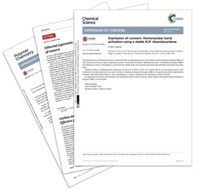Advertisement
Grab your lab coat. Let's get started
Welcome!
Welcome!
Create an account below to get 6 C&EN articles per month, receive newsletters and more - all free.
It seems this is your first time logging in online. Please enter the following information to continue.
As an ACS member you automatically get access to this site. All we need is few more details to create your reading experience.
Not you? Sign in with a different account.
Not you? Sign in with a different account.
ERROR 1
ERROR 1
ERROR 2
ERROR 2
ERROR 2
ERROR 2
ERROR 2
Password and Confirm password must match.
If you have an ACS member number, please enter it here so we can link this account to your membership. (optional)
ERROR 2
ACS values your privacy. By submitting your information, you are gaining access to C&EN and subscribing to our weekly newsletter. We use the information you provide to make your reading experience better, and we will never sell your data to third party members.
Graduate Education
University of Texas can’t take away student’s PhD
Court bases decision on 50-year-old Texas case
by Bethany Halford
February 22, 2019

The University of Texas at Austin does not have the authority to revoke a student’s degree, according to a Feb. 11 ruling by Judge Karin Crump in Travis County, Texas district court. The judgment is the latest turn in the university’s years-long effort to strip Suvi Orr of her doctorate in chemistry.
Orr began her graduate studies in organic synthesis in Stephen Martin’s lab in 2003. In 2008 she successfully defended her thesis. But six years later, UT Austin sent a certified letter to Orr saying the school was invalidating her thesis based on research misconduct. The university cited a 2011 Organic Letters paper that was retracted in 2012 (DOI: 10.1021/ol302236g) because two steps in the synthesis could not be reproduced.
Orr, now a senior principal scientist at Pfizer, denies any wrongdoing. “The allegations were all related to the 2011 Organic Letters paper,” she says. “It was drafted and put together by Professor Martin and a postdoc who was at UT at the time. I did not write it.” Her attorneys, Anita Kawaja and David Sergi, say UT Austin’s claim of misconduct revolves around three nuclear magnetic resonance spectra.
“She discussed all this data with Professor Martin, and he reviewed it with her,” Kawaja says. With his input as her mentor, she reported it in her dissertation. “The three datapoints at issue are entirely irrelevant to Dr. Orr’s dissertation,” Kawaja adds. “She could have taken that data out of her dissertation and it wouldn’t have affected the conclusion. She still would have been qualified to receive her degree.” It wasn’t until 2011 that Martin approached Orr about publishing the work. Kawaja said Orr agreed to do so only because Martin reassured her that the data had been reproduced.
Martin declined to comment.
In 2017 Orr won an injunction preventing UT Austin from taking her degree away until a judge had ruled whether the school had the authority to do so. In their request for the injunction, Orr’s lawyers write that her career and livelihood “hinge on how a panel of undergraduate students review and interpret highly complex scientific data at the doctoral and postdoctoral level in organic chemistry.” They add, “the University’s intended proceedings clearly demonstrate the panel will either be delving into an area in which they are unqualified to judge or that the University’s student justice panel is a kangaroo court that affords [Orr] neither due process nor justice.”
“I was always ready to defend my research and my skills, and I had asked that the University of Texas provide fairness and transparency in finding the truth,” Orr says. “But as I tried to cooperate with them, I quickly discovered that their administrative process is inherently biased and Professor Martin and UT had their own agendas.”
The only place Orr can get an unbiased ruling is in a courtroom, Kawaja says. She and Sergi argued that position based on a 1969 Texas Attorney General Opinion, which ruled that UT Austin could not revoke a student’s degree.
Advertisement
Orr’s case is “very unusual,” Sergi says. It’s not common for a university to strip students of their degree. Additionally, Orr’s case “shines a light on the lack of due process in the university setting,” he says. “We are simply asking for some equality, to have the decision-maker be truly unbiased, like a court judge, as opposed to someone who is connected to the university.”
Orr also requested that the university pay her legal fees, but Judge Crump did not grant that. Kawaja says the legal team is looking at their options for financial recourse.
Gary Susswein, UT Austin’s chief communications officer, says, “the university respectfully disagrees with the ruling and is reviewing it to determine our options.” UT Austin can appeal the ruling.
Although the ruling has clear implications for students in Texas, it may not apply elsewhere because it is based on state law, says Jonathan L. Kennedy, chair of the American Chemical Society’s Division of Chemistry and the Law. “Each state’s own laws regarding degree retraction would have to be consulted to assess what grounds could prompt retraction and what process would be required to do so,” he says.




Join the conversation
Contact the reporter
Submit a Letter to the Editor for publication
Engage with us on Twitter